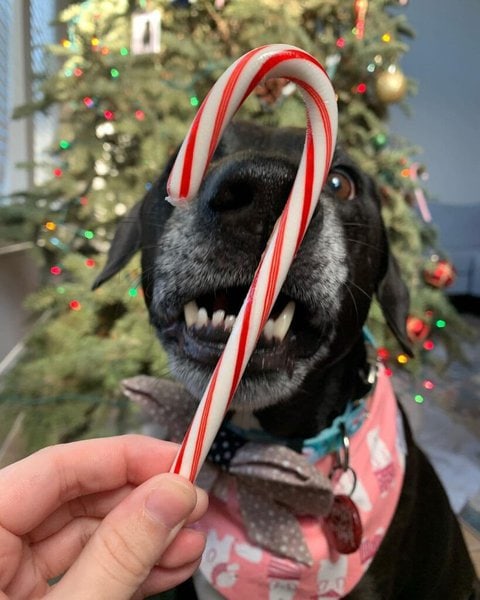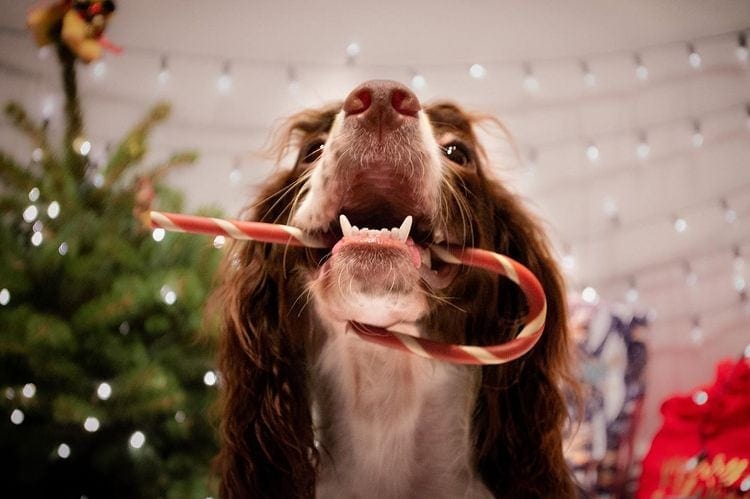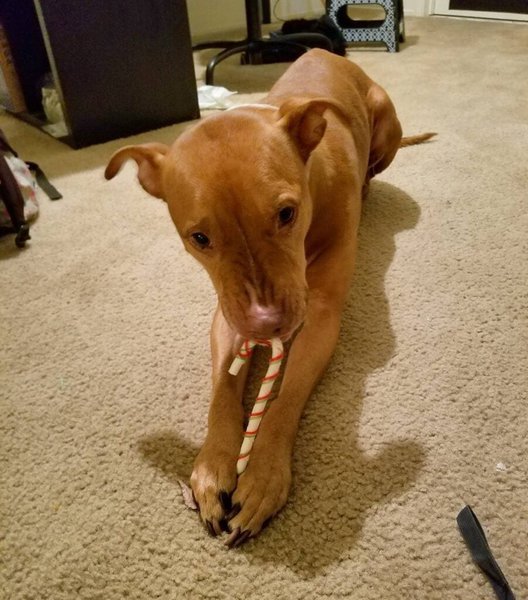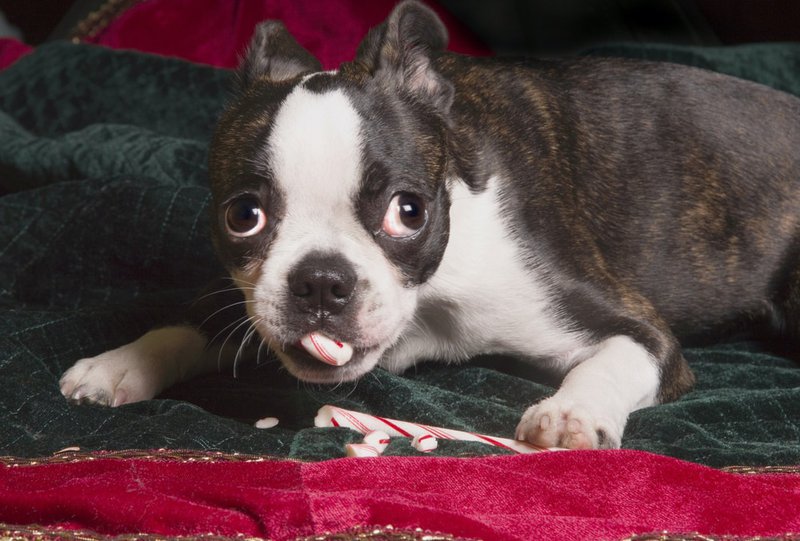Candy canes are a popular fixture in numerous American homes during festive periods. And apart from being used for decorating Christmas trees, candy canes also make for a very tasty human treat, but are they safe for our canine buddies to consume?
So, can dogs eat candy cane? Candy canes contain an unhealthy amount of sugar, and as a result, are not safe for consumption by dogs. In the same vein, some candy cane products contain a sugar substitute, xylitol, and this is highly toxic when ingested by dogs.
It can be quite difficult having to turn down your canine buddy’s appealing eyes when you’re chewing on that candy cane, but this is something you have to do to ensure your pooch’s safety. Feeding your dog with candy canes can result in extreme repercussions, and this article duly covers some of the dangers of feeding your pooch with this food substance, as well as what to do when your pooch mistakenly chomps on this candy treat.
However, before we go further, let’s take a closer look at what it is that makes candy cane dangerous for dogs to eat.
Can Dogs Eat Candy Canes?

No, dogs can’t and shouldn’t eat candy canes. And you should, by all means possible, avoid feeding this food substance to your dog.
Just as the name implies, candy cane contains a considerably high amount of sugar, but this isn’t what makes this food substance particularly dangerous for dogs. Dogs can tolerate natural sugar in small amounts, but most candy cane products typically make use of Xylitol, a common sugar substitute that is very toxic for dogs.
Most candy canes are formulated with sugar, which can be in the form of Xylitol, corn syrup, peppermint oil, and dyes. And even from the list of options, it is clear to see that sugar accounts for the majority of candy canes, and the risk of dogs consuming such a sizable amount of sugar can’t be overstated.
Also, apart from the high sugar content of candy canes, these food substances typically have no nutritional value, and by feeding your canine buddy with candy canes, you would just be endangering its health for nothing.
Candy canes basically contain just sugar and calories with a negligible amount of carbohydrates! There are no proteins, vitamins, or minerals that can be beneficial to a pooch’s health in candy canes.
What Happens If A Dog Eats A Candy Cane?

Possible side effects of feeding a dog with candy cane include xylitol poisoning, damage to the pooch’s gastrointestinal tract, gastrointestinal blockage, and the development of weight-related issues.
Xylitol Poisoning
As mentioned earlier, xylitol is a common ingredient in candy canes, and eating just a small amount of this substance can cause xylitol poisoning, which can lead to a myriad of problems for your canine buddy.
Side effects of xylitol poisoning in dogs include lowering the dog’s blood sugar level, which is typically characterized by symptoms such as sudden weakness, lethargy, loss of body coordination, and seizures. Also, the littlest amounts of xylitol can result in liver damage for a dog, and if care isn’t taken, this can lead to your canine buddy’s death.
Weight-Related Issues
Apart from suffering the effects of xylitol poisoning, dogs that are regularly fed with candy canes are liable to develop weight-related health problems, such as obesity and diabetes.
And while these health problems aren’t immediately fatal, they lead to the degradation of a pooch’s quality of life over time, and if not properly managed, can result in such a dog’s death!
Gastrointestinal Blockage
Candy canes typically come with a wrapper that can be easily mistaken to be part of the candy by dogs, thereby leading the pooches to consume the wrapper with the cane; This situation is very dangerous for dogs and can result in an obstruction of the pooch’s gastrointestinal tract, which will need to be corrected with surgery.
Damage To The Dog’s Stomach Lining
Apart from the fact that candy canes contain ingredients that can be extremely harmful to a dog’s health, the cane itself typically has sharp edges that can potentially puncture a dog’s insides – either the esophagus, stomach, or intestines – when ingested.
With humans, this issue of sharp edges is avoided by sucking on the cane to create smoother edges. But dogs, on the other hand, aren’t that patient. In your canine buddy’s haste to break down and chomp on the candy cane, it will create several sharp pieces which is potentially harmful to the pooch.
Common observable signs that your dog’s insides have been punctured by a candy cane include a bloated belly, dry cough, loss of appetite, and lethargy, just to mention a few. And if not promptly attended to, a punctured stomach can prove to be fatal for a dog.
What Should I Do If My Dog Eats A Candy Cane?

If your dog eats a candy cane containing xylitol, you should immediately contact your vet or any available animal emergency services.
As a matter of fact, placing your dog under close surveillance round the clock is nearly impossible to pull off. And there’s every chance that once you stop watching, your canine buddy may sneak off and have a taste of that candy cane it has been eyeing since.
Contact Your Vet
If you think your dog may have consumed candy cane containing xylitol or observed any of the symptoms synonymous with xylitol poisoning in dogs, the first thing to do is to immediately contact your vet or an animal poison control center.
Most times, symptoms of Hypoglycemia in dogs don’t manifest until between 12 to 24 hours after the pooch in question has eaten candy cane; Hence, your canine buddy may need to be hospitalized and placed under strict observation.
If, however, by a stroke of luck, you check the label of the candy cane eaten by your canine buddy and you notice the absence of xylitol, you may not need the services of a vet. But regardless, you should closely monitor your canine buddy and waste no time contacting your vet if you notice anything odd about the dog.





